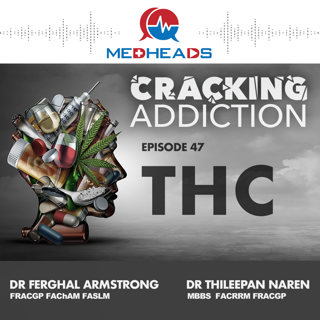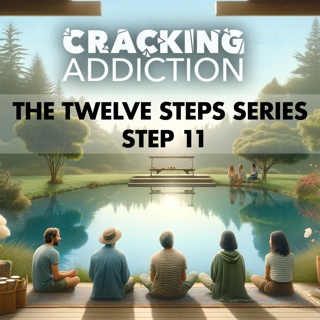
Exploring Step 11: Enhancing Connection with a Higher Power in Recovery
Dr. Ferghal Armstrong and Dr. Laura Petracek delve into the 11th step of the twelve-step program, discussing the significance of prayer and meditation in improving conscious contact with a higher power. The episode explores the practical ways individuals can manifest the 11th step in their daily lives and the impact of skepticism on recovery. Listeners will gain valuable insights into the role of connection in recovery, the importance of a sponsor, and the transformative potential of the 11th step prayer.Dr. Laura Petracek and Dr. Ferghal Armstrong provide an in-depth analysis of the 11th step, emphasising the focus on conscious contact with a higher power and praying for knowledge of that power's will. The conversation also touches on the evolution of the interpretation of a higher power and the challenges of incorporating the 11th step into daily practice. The speakers shed light on the impact of skepticism on engagement with the step and the importance of sponsors and connection in recovery.**Learning Outcomes:**1. Understanding the 11th step: Gain insight into the significance of prayer and meditation in establishing conscious contact with a higher power as outlined in the twelve-step program.2. Practical manifestation: Explore different methods to incorporate prayer and meditation into daily recovery practice, from reading meditation books to journaling and seeking guidance.3. Impact of skepticism on recovery: Recognise the implications of skepticism and defiance on engagement with the twelve-step program, and the importance of empathy and exploration of alternative avenues for connection.4. The role of sponsors and connection: Appreciate the significance of sponsors in reframing the 11th step and the transformative potential of finding connection in recovery.**Actionable Takeaways:**1. Start each day with a moment of prayer or meditation to establish a connection with a higher power and seek guidance on your journey of recovery.2. Explore various methods of meditation, such as reading meditation books, journaling, or even engaging in outdoor activities, to foster a deeper spiritual and introspective practice.3. Recognise the impact of skepticism on engagement with recovery programs and consider the role of empathy and exploration of alternative paths for connection and healing.4. Emphasise the role of sponsors and the power of connection in finding support and reframing the 11th step, seeking guidance from those who have walked a similar path.**Quote:**"Getting quiet and doing meditation help facilitate the process of discerning the right choices, instead of overthinking and trying to solve problems on our own."
7 Feb 202423min
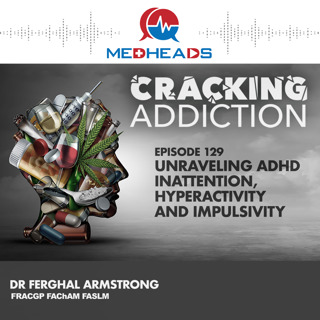
Unraveling ADHD: Inattention, Hyperactivity, and Impulsivity
In this episode of Cracking Addiction, Dr. Ferghal Armstrong and Dr. Manu Bhatnagar delve into the complexities of screening for ADHD in both children and adults. They break down the core concepts of inattention, impulsivity, and hyperkinesis, providing valuable insights into the often-misunderstood symptoms of this condition. Understanding how ADHD presents in children and adults, as well as the differential diagnosis considerations, can be crucial for parents, educators, and healthcare professionals. This episode offers valuable information for anyone navigating the challenges of identifying and understanding ADHD.Focus Keyword: ADHD ScreeningDr. Manu Bhatnagar provides an in-depth understanding of inattention, explaining that ADHD doesn't necessarily equate to a deficiency in attention, but rather an inability to focus on a particular task for an extended period. He clarifies the distinction between concentration and attention, shedding light on the struggles individuals with ADHD face in prioritizing tasks and maintaining focus.Learning Outcomes:1. Understanding the Complexities of ADHD Presentation: Dr. Bhatnagar's insights highlight the multifaceted nature of ADHD symptoms, providing a clearer understanding of the challenges individuals face in managing their attention and impulsivity.2. Differential Diagnosis Considerations: By exploring alternative diagnoses such as anxiety and autistic spectrum disorder, listeners gain an understanding of the importance of comprehensive assessments in ruling out other potential conditions before reaching an ADHD diagnosis.3. The Impact of ADHD on Children: The episode delves into the potential repercussions of undiagnosed ADHD in children, offering valuable insights for parents and educators to recognize and address symptoms early on.4. Utilising Screening Tools and Collateral Interviews: The discussion emphasises the significance of structured screening tools and obtaining collateral information from multiple sources to achieve a robust ADHD diagnosis.Actionable Takeaways:1. Encourage Collaborative Approach: Healthcare professionals, educators, and parents are encouraged to collaborate in providing comprehensive insights into a child's behaviour, ensuring all facets are considered when assessing ADHD.2. Early Intervention: Recognising and addressing symptoms of ADHD in children early on can help prevent potential emotional and psychological impacts, emphasising the need for proactive intervention and support.3. Comprehensive Assessments: Consider a holistic approach to diagnosis, including screening tools, collateral interviews, and comprehensive assessments, ensuring a thorough evaluation to capture the complexities of ADHD symptoms.4. Seeking Support and Understanding: Individuals with ADHD may benefit from tailored support and understanding, emphasizing the importance of creating an environment that accommodates neurodiversity.Quote:Dr. Bhatnagar highlights the impact of undiagnosed ADHD, stating, "You can treat ADHD with a pill, you can't undo years of having undiagnosed ADHD and what that might do to someone's sense of self."keywordsADHD, prevalence, mental disorder, neurodevelopmental, screening, impulsivity, inattention, hyperkinesis, concentration, dopamine, norepinephrine, hyperfocus, success, expert, myth, functional, diagnostic criteria, sex gender, subtype, fidgeting, impulsivity, hyperactivity, angry outbursts, anxiety, sensitivity, specificity, differential diagnosis, language disorder, autism spectrum disorder, social services, psychosocial interventions
31 Jan 202422min
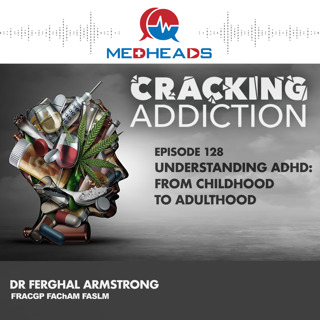
Understanding ADHD: From Childhood to Adulthood
In this groundbreaking episode of Cracking Addiction, Dr. Ferghal Armstrong and Manu Bhatnagar guide listeners through a deep dive into ADHD, unraveling its complexities and controversies. The duo dissects the widely debated concept of ADHD from a neuropsychological standpoint, exploring its validity, prevalence, and implications for both children and adults. Listeners will gain valuable insights into the social constructs and cultural influences shaping ADHD diagnosis and management.**Key Points**:1. ADHD as a Real Neurological Disorder2. Social Construct Controversy3. Prevalence and Diagnostic Criteria4. ADHD in Children and Adults5. Retrospective Diagnosis and Comorbidities6. Higher Prevalence in Incarcerated Populations and Substance Users**Learning Outcomes**:1. Understanding ADHD as a Real Neurological Disorder: Dr. Bhatnagar's explanation sheds light on the misconceptions surrounding ADHD and reaffirms its standing as a neurodevelopmental disorder. Listeners will gain a comprehensive understanding of the neurological underpinnings and complexities of ADHD, dispelling any lingering doubts about its legitimacy.2. Unraveling the Social Construct Controversy: The insightful discussion delves into the social construct controversy surrounding ADHD, providing a nuanced perspective on how societal factors can impact its diagnosis and management. Listeners will grasp the intricate balance between neurobiological constructs and environmental influences in delineating ADHD.3. Exploring Prevalence and Diagnostic Criteria: Dr. Armstrong and Dr. Bhatnagar offer a detailed exploration of the prevalence and diagnostic criteria for ADHD, elucidating the contrast and impact of using DSM criteria versus ICD criteria. Listeners will grasp the intricacies of diagnosing ADHD in children and gain awareness of the challenges in assessing the disorder in adults.4. Navigating ADHD in Children and Adults: Through the episode, listeners will gain a deeper comprehension of how ADHD manifests in children and the transition into adulthood. The nuanced discussion presents a holistic view of the developmental trajectory of ADHD, fostering a balanced understanding of its implications across different life stages.5. Retrospective Diagnosis and Comorbidities: The speakers unravel the complexity of retrospectively diagnosing ADHD in adults and the intricacies of identifying co-occurring conditions. Listeners will gain insights into the challenges of retrospective diagnosis, emphasising the need for thorough assessments to ensure accurate diagnoses in adulthood.**Actionable Takeaways**:1. Foster Empathy and Understanding: Emphasise the real neurobiological underpinnings of ADHD to foster empathy and understanding for individuals struggling with the disorder, dispelling societal stigmas and misconceptions.2. Advocate for Comprehensive Assessment: Encourage comprehensive assessments, including collateral evidence from early life, to ensure accurate and thorough diagnoses of ADHD in both children and adults, promoting effective interventions.3. Consider Cultural and Social Influences: Remain cognisant of the cultural and social influences shaping the diagnosis and management of ADHD, recognizing the dynamic interplay between biological factors and environmental context.4. Support Holistic Approaches to Treatment: Emphasise the importance of holistic treatment approaches for ADHD, including psychosocial interventions alongside pharmacological interventions, to address the multifaceted nature of the disorder. #ADHD #Neurodiversity #MentalHealthMatters #Neuroplasticity #PsychiatricDiagnosis #SocialConstruct #Comorbidities #HolisticTreatment #ChildhoodDevelopment #AdultADHD
24 Jan 202421min
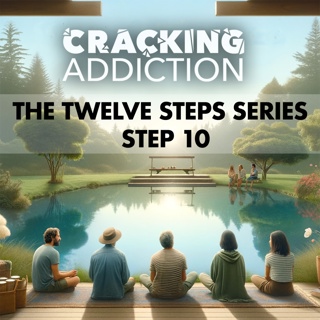
Exploring Step 10 of Recovery and Personal Reflection
Welcome to the latest instalment of the Cracking Addiction newsletter. In this episode, I dive deep into Step 10 of the twelve-step journey with Dr. Laura Petracek. We explore the ongoing process of personal inventory and prompt amends, shedding light on the critical role of self-reflection in addiction recovery.Why Listen:If you're looking to gain insights into maintaining sobriety and personal growth in addiction recovery, this episode is not to be missed. Step 10, addressed alongside Dr. Laura Petracek, delves into the ongoing commitment to self-reflection and the importance of making amends. It also offers valuable lessons for anyone seeking to improve their personal growth journey.Key Points You Will Learn:1. The 10th step involves an ongoing self-reflection process where individuals take inventory of their daily behaviours and promptly make amends when necessary.2. Step 10 is not a formalised process like the previous steps. It represents a summary of the earlier steps, requiring individuals to take personal responsibility for their actions.3. Dr. Laura Petracek sheds light on the challenges individuals face in staying on their side of the street and not resorting to the blame game when making amends.4. The episode discusses how relapse is not an inevitable part of the recovery journey and explores the significance of mindset in preventing a potential relapse.5. We delve into the analogy of recovery being akin to cycling uphill, emphasising the need for ongoing effort and growth to prevent stagnation or relapse.Interesting Fact:The episode highlights the concept that relapse is a process, not just a single event. Dr. Laura Petracek explains that the cognitive distortions and behaviours leading up to the actual act of picking up a drink or a drug are equally crucial and warrant attention.Learning Outcomes and Actionable Takeaways:1. Develop an understanding of the ongoing self-reflection process involved in Step 10 and recognize the importance of making amends promptly.2. Gain insights into the challenges individuals face in maintaining personal accountability and learn strategies to overcome the tendency to indulge in the blame game.3. Understand the nuanced view of relapse as a process and explore the proactive efforts that can help prevent a potential relapse.4. Embrace the analogy of recovery being akin to cycling uphill, fostering a mindset of continuous effort and growth to sustain sobriety and personal development.5. Gain valuable insights from Dr. Laura Petracek's personal journey and expertise, reinforcing the idea of recovery as an ongoing and transformative process.As Dr. Laura Petracek aptly puts it, "I feel we could concentrate or bring that message. Like, that's not an option anymore. I feel there's so much permission, and that's okay. You could go out 50 million times, and I think that could be changed."
18 Jan 202422min
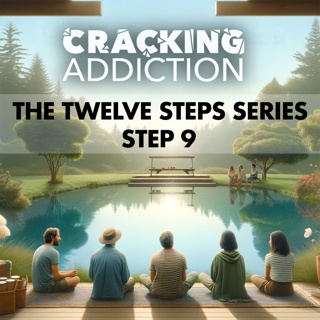
Navigating Amends: Step 9
In this episode of Cracking Addiction, Dr. Ferghal Armstrong and Dr. Laura Petracek delve into the complexities of the 9th step of the addiction recovery journey, which involves making direct amends to those who have been hurt. Dr. Petracek shares insights from her personal experience, providing a deep understanding of the emotional and psychological struggles involved in this step. Listeners will gain an in-depth understanding of the 9th step, the process of making amends, the intricate dynamics involved, and the impact on recovery.
10 Jan 202423min
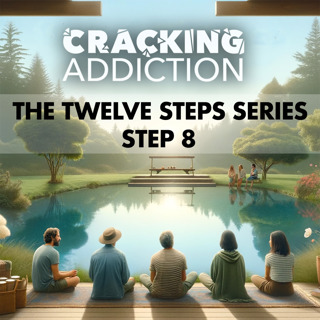
Step 8: Making Amends
In this episode of Cracking Addiction, Dr. Fergal Armstrong and Dr. Laura Petracek discuss the challenging 8th step in addiction recovery – making a list of persons who have been harmed and becoming willing to make amends to them. The conversation delves into the emotional and practical complexities of this step, offering invaluable insights into the process of self-reflection, making amends, and navigating the internal and external obstacles in the recovery journey. Listeners will gain a deeper understanding of the 8th step and its significance in the recovery process, as well as practical strategies for approaching this crucial aspect of addiction rehabilitation.
3 Jan 202416min
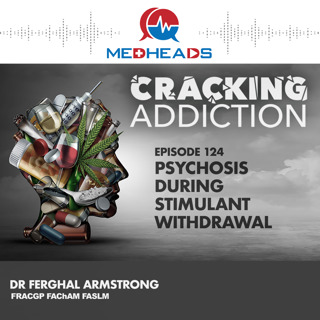
Psychosis During Stimulant Withdrawal
In this episode of Cracking Addiction, Dr. Ferghal Armstrong and Dr. Manu Bhatnagar delve into the complex issue of psychosis in the context of withdrawal treatment or when withdrawing from stimulants such as methamphetamine. They explore the challenges of distinguishing between drug-induced psychosis and primary psychotic disorders, and discuss the intricacies of treatment options, including the use of benzodiazepines and antipsychotics. With valuable insights and clinical expertise, this episode provides a deep understanding of the management of psychosis in the context of substance withdrawal.Key Points:- Differentiating between drug-induced psychosis and primary psychotic disorders is a challenging yet crucial aspect of patient care in the context of substance withdrawal.- Understanding the neurochemical impact of stimulants on the brain and the implications for treatment is essential for managing psychotic symptoms effectively.- The role of benzodiazepines and antipsychotics in controlling agitation and psychotic symptoms during withdrawal and the potential transition to more long-term antipsychotic therapy in cases of persistent symptoms.- The importance of comprehensive and integrated psychosocial support alongside medication in ensuring long-term recovery and abstinence.Insightful Quote:"The best amount of medication is the least effective dose. My role is to say, how much support can we put around you? So I can bring this dose down to a level where it's causing the least amount of side effects, but it's just enough to prevent the next episode happening." - Dr. Manu BhatnagarLearning Outcomes:1. Gain insights into the complexities of distinguishing between drug-induced psychosis and primary psychotic disorders, and the implications for treatment decisions.2. Understand the neurochemical basis of stimulant-induced psychosis and the role of medications such as benzodiazepines and antipsychotics in managing psychotic symptoms during withdrawal.3. Appreciate the significance of longitudinal assessment and psychosocial support in the overall management of psychosis in the context of substance withdrawal.4. Explore the potential transition to long-term antipsychotic therapy and the importance of holistic approaches to supporting recovery and abstinence.Actionable Takeaways:1. When managing patients undergoing withdrawal from stimulants, establish a timeline of substance use and psychotic symptoms to differentiate between drug-induced psychosis and primary psychotic disorders.2. Consider the neurochemical impact of stimulants and the mechanisms of action of benzodiazepines and antipsychotics to tailor treatment for psychotic symptoms during withdrawal.3. Emphasize the role of comprehensive psychosocial support and longitudinal assessment in ensuring successful recovery and abstinence post-withdrawal.4. Strive for a balanced approach to medication, aiming for the least effective dose while providing adequate support to prevent future episodes of psychosis.
27 Dec 202315min
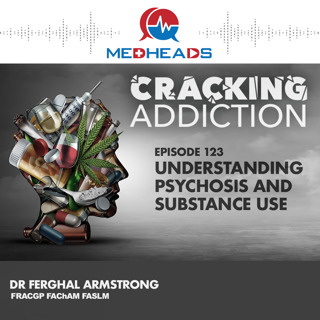
Understanding Psychosis and Substance Use
In this episode of Cracking Addiction, Dr. Ferghal Armstrong and guest Dr. Manu Bhatnagar engage in a deep dive into the complex topic of psychosis, specifically in the context of substance use disorders. With a focus on understanding the nature of psychosis, the impetus behind psychotic experiences, and the differentiating factors between substance-induced psychotic disorders and primary schizophrenia disorders, this episode imparts valuable insights for both healthcare professionals and individuals affected by addiction and mental health issues.Focus Keyword: Psychosis in AddictionIn this episode of Cracking Addiction, Dr. Manu Bhatnagar and Dr. Ferghal Armstrong dissect the nature of psychosis, emphasizing its status as a symptom rather than a standalone illness. They highlight the potential influences of social and cultural contexts on the diagnosis of psychosis, shedding light on the impact of societal trends and media portrayals on the manifestation of psychotic experiences. The discussion delves into the potential causes of psychosis, including the interplay of genetic, environmental, and substance-related factors.Learning Outcomes:1. Understanding the Multifaceted Nature of Psychosis: Dr. Bhatnagar provides a comprehensive overview of psychosis, defining it as a disruption of thought, perception, and cognition. This highlights the diversity of psychotic experiences and the importance of individual past experiences in shaping these manifestations. The discussion offers a nuanced understanding of psychosis as a complex interplay of factors, paving the way for more holistic approaches to addressing psychotic symptoms.2. Differentiating Substance-Induced Psychotic Disorders: The episode elucidates the distinction between substance-induced psychotic disorders, particularly those triggered by stimulants and cannabis, and primary schizophrenia disorders. The emphasis on psychomotor agitation as a hallmark of substance-induced psychosis provides a valuable framework for clinicians to differentiate these conditions, informing targeted interventions.3. Longitudinal Assessment and Treatment Implications: The speakers underscore the significance of longitudinal assessment in distinguishing substance-induced psychosis from primary schizophrenia disorders. This insight carries profound implications for treatment, as the potential resolution of symptoms with abstinence underscores the importance of addressing substance use in managing psychotic experiences.Actionable Takeaways:1. Embrace a Holistic Understanding: Recognize the multifactorial nature of psychosis, encompassing genetic predispositions, environmental influences, and substance-related triggers. This broader perspective can inform more comprehensive treatment strategies, taking into account the diverse factors contributing to psychotic experiences.2. Heightened Clinical Vigilance: Develop a heightened awareness of the hallmarks of substance-induced psychotic disorders, such as psychomotor agitation and acute onset in the context of substance use. This keen clinical vigilance can aid in accurate differential diagnosis and tailored interventions for individuals presenting with psychotic symptoms.3. Prioritize Longitudinal Assessment: Prioritize longitudinal assessment, particularly in cases of suspected substance-induced psychosis, to discern the potential impact of substance use on psychotic experiences. This approach underscores the importance of addressing substance use disorders in managing psychosis and promoting long-term recovery.
20 Dec 202327min
